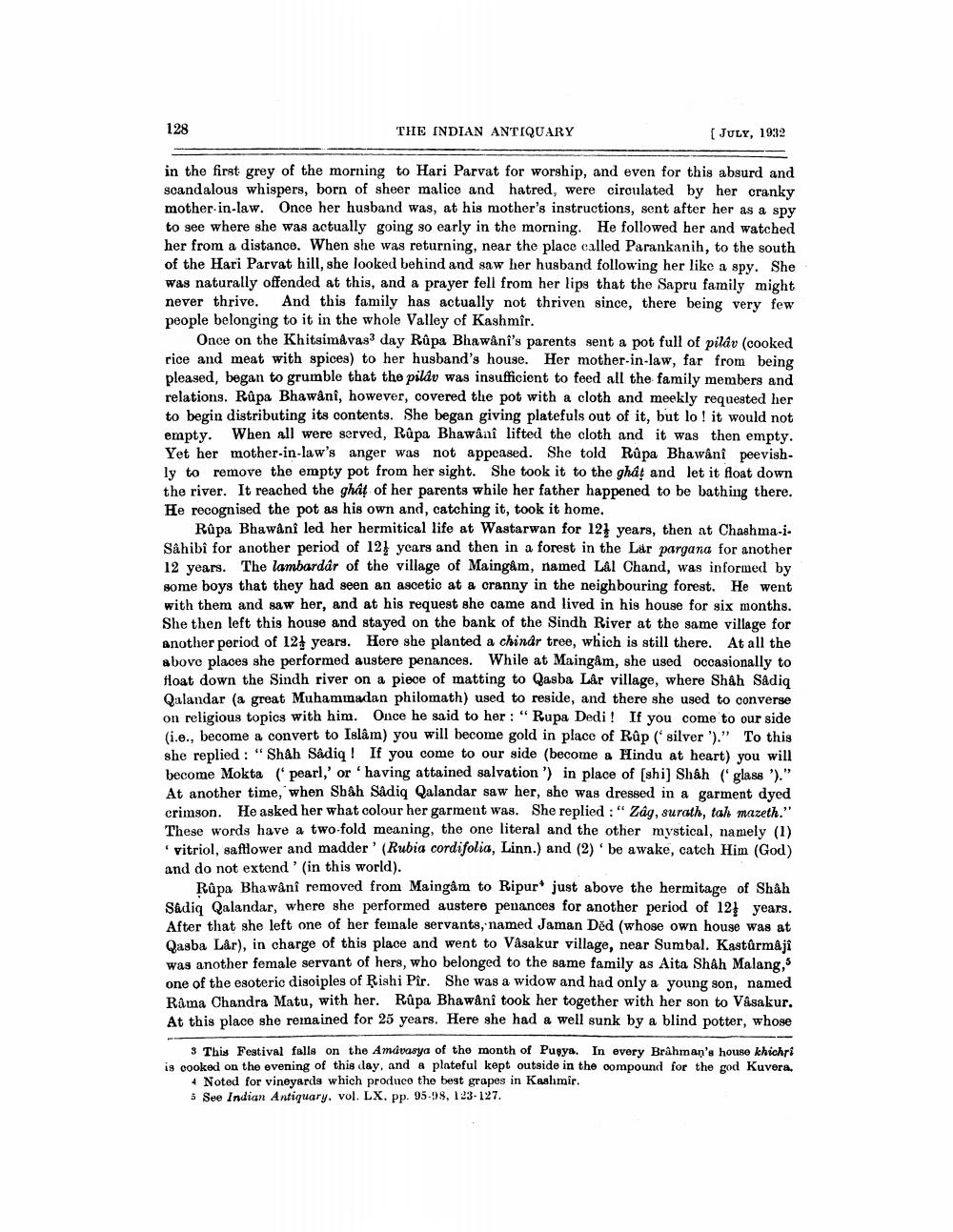________________
128
THE INDIAN ANTIQUARY
[ JULY, 1932
in the first grey of the morning to Hari Parvat for worship, and even for this absurd and scandalous whispers, born of sheer malice and hatred, were circulated by her cranky mother-in-law. Once her husband was, at his mother's instructions, sent after her as a spy to see where she was actually going so early in the morning. He followed her and watched her from a distance. When she was returning, near the place called Parankanih, to the south of the Hari Parvat hill, she looked behind and saw her husband following her like a spy. She was naturally offended at this, and a prayer fell from her lips that the Sapru family might never thrive. And this family has actually not thriven since, there being very few people belonging to it in the whole Valley of Kashmir.
Once on the KhitsimAvasday Rûpa Bhawani's parents sent a pot full of pilav (cooked rice and meat with spices) to her husband's house. Her mother-in-law, far from being pleased, began to grumble that the pilav was insufficient to feed all the family members and relations. Rûpa Bhawani, however, covered the pot with a cloth and meekly requested her to begin distributing its contents. She began giving platefuls out of it, but lo! it would not empty. When all were served, Rupa Bhawani lifted the cloth and it was then empty. Yet her mother-in-law's anger was not appeased. She told Rûpa Bhawani peevishly to remove the empty pot from her sight. She took it to the ghag and let it float down the river. It reached the ghat of her parents while her father happened to be bathing there. He recognised the pot as his own and, catching it, took it home.
Rûpa Bhawani led her hermitical life at Wastarwan for 121 years, then at Chashma-i. Sâhibi for another period of 12 years and then in a forest in the Lår pargana for another 12 years. The lambardar of the village of Maingam, named Lal Chand, was informed by some boys that they had seen an ascetic at a cranny in the neighbouring forest. He went with them and saw her, and at his request she came and lived in his house for six months. She then left this house and stayed on the bank of the Sindh River at the same village for another period of 121 years. Here she planted a chindr tree, which is still there. At all the above places she performed austere penances. While at Maingam, she used occasionally to Hoat down the Sindh river on a piece of matting to Qasba Lår village, where Shah Sadiq Qalandar (a great Muhammadan philomath) used to reside, and there she used to converse on religious topics with him. Once he said to her: “Rupa Dedi! If you come to our side (1.., become a convert to Islâm) you will become gold in place of Rûp (silver ')." To this she replied: "Shah Sadiq ! If you come to our side (become a Hindu at heart) you will become Mokta (pearl,' or 'having attained salvation') in place of [shi] Shah (glass)." At another time, when Sb&h Sadiq Qalandar saw her, she was dressed in a garment dyed crimson. He asked her what colour her garment was. She replied :" Zag, surath, tah mazeth." These words have a two-fold meaning, the one literal and the other mystical, namely (1)
vitriol, safflower and madder '(Rubia cordifolia, Linn.) and (2)' be awake, catch Him (God) and do not extend' (in this world).
Rûpa Bhawani removed from Maingâm to Ripur* just above the hermitage of Shah Sadiq Qalandar, where she performed austere penances for another period of 12 years. After that she left one of her female servants, named Jaman Déd (whose own house was at Qasba Lar), in charge of this place and went to Vâsakur village, near Sumbal. Kastûrmaji was another female servant of hers, who belonged to the same family as Aita Shah Malang, one of the esoteric disciples of Rishi Pîr. She was a widow and had only a young son, named Rama Chandra Matu, with her. Rûpa Bhawani took her together with her son to Vasakur. At this place she remained for 25 years. Here she had a well sunk by a blind potter, whose
3 This Festival falls on the Amdvasya of tho month of Pugya. In every Brahman's house khíchri is cooked on the evening of this day, and a plateful kept outside in the compound for the god Kuvera,
+ Noted for vineyards which produce the best grapes in Kashmir. 5 See Indian Antiquary. vol. LX. pp. 95-99, 123-127.




